
January 20
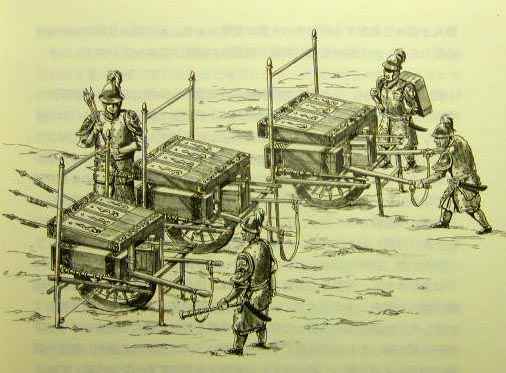
1045 Rocketry: The first record of using a chemical substance as a propellant for a primitive rocket pops up in ancient China. Until this time, various Chinese sources have recorded the use of "fire arrows," a term somewhat too ambiguous to determine whether or not the chroniclers meant rockets, or arrows carrying a flammable substance. "Fire sticks," bamboo tubes filled with saltpeter, sulfur, and charcoal, have previously been in the arsenals of many a Chinese warlord. (Temple, Crosby) [See: Wunderwaffen: Hitler's Deception and the History of Rocketry.]
1841 Hong Kong ceded to the British:
During the First Opium War, China cedes the island of Hong Kong to the British with the signing of the Chuenpi Convention, an agreement seeking an end to the first Anglo-Chinese conflict.
In 1839, Britain invaded China to crush opposition to its interference in the country's economic and political affairs. One of Britain's first acts of the war was to occupy Hong Kong, a sparsely inhabited island off the coast of southeast China. In 1841, China ceded the island to the British, and in 1842 the Treaty of Nanking was signed, formally ending the First Opium War. [For further information, click here]
1914 Adolf Hitler: A terse telegram from the Linz authorities arrives at the Austrian Consulate: MUST REPORT ON JANUARY 20. Since it is already January 20, the Consul General intercedes, and dispatches a long letter [See January 19, 1914] composed by Hitler and his lawyer to the Linz authorities. It is accompanied by a covering letter stating that both the Consulate and the Munich police are convinced of Hitler's honesty, and that he seems "extremely deserving of considerate treatment." The Linz officials accept Hitler's pleas at face value, and rule that he report for a medical examination in Salzburg—which is closer to Munich than Linz—in preparation for his enlistment in the Austrian military. [For further details, Click here.]
1918 World War I: War at Sea: The German light cruiser Breslau is sunk by mines outside the Dardanelles. Only 162 of 370 crew members survive. [For further details, Click here.]
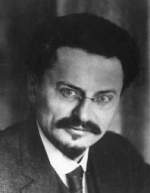
1929 USSR: Trotsky: The Soviet OGPU (General Political Administration) orders that Trotsky be deported to the Turkish island of Prinkipo, once used by the Byzantine emperors to exile their opponents. He will live in Turkey (1929-33), France (1933-35), Norway (1935-36), and Mexico (1936-40).
1935 Zionism: The National Conference on Palestine is held in Washington, DC.
1936 United Kingdom:
Death: King George V:
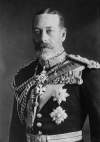
The nature of the monarchy evolved through the influence of George. In contrast to his grandmother and father—Victoria's ambition to exert political influence in the tradition of Elizabeth I and Edward VII's aspirations to manipulate the destiny of nations—George's royal perspective was considerably more humble. He strove to embody those qualities, which the nation saw as their greatest strengths: diligence, dignity and duty. The monarchy transformed from an institution of constitutional legality to the bulwark of traditional values and customs (particularly those concerning the family). Robert Lacey describes George as such: "As his official biographer felt compelled to admit, King George V was distinguished 'by no exercise of social gifts, by no personal magnetism, by no intellectual powers. He was neither a wit nor a brilliant raconteur, neither well-read nor well-educated, and he made no great contribution to enlightened social converse. He lacked intellectual curiosity and only late in life acquired some measure of artistic taste.' He was, in other words, exactly like most of his subjects. He discovered a new job for modern kings and queens to do—representation.
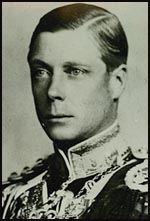
Accession: Edward VIII inherits the throne: The next day, he broke royal protocol by watching the proclamation of his own accession to the throne from a window in the company of the then-still-married Mrs. Simpson.
1937 Various:

USA: Inauguration: FDR, the 32nd president, becomes the first US President to be inaugurated on January 20th. This is his second term on office. The 20th Amendment of the US Constitution set the date, officially, for the swearing in of the President and Vice President. The amendment was ratified by Congress in 1933. It is the first time the vice president-elect is inaugurated out-of-doors on the same platform with the president-elect. No vice presidential address is given.
I see millions denied education, recreation, and the opportunity to better their lot and the lot of their children. I see millions lacking the means to buy the products of farm and factory and by their poverty denying work and productiveness to many other millions. I see one-third of a nation ill-housed, ill-clad, ill-nourished. It is not in despair that I paint you that picture. I paint it for you in hope—because the Nation, seeing and understanding the injustice in it, proposes to paint it out.
From a report by Ambassador Davies to the US Secretary of State:
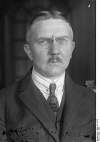
Hjalmar Schacht stated the following: That the present condition of the German people was intolerable, desperate, and unendurable; that he had been authorized by his Government to submit proposals to France and England which would: (1) Guarantee European peace, (2) secure present European international boundaries, (3) reduce armaments, (4) establish a new form of a workable league of nations, and (5) abolish sanctions with new machinery for joint administration; all based upon a colonial cession that would provide for Germany an outlet for population, a source for food stuffs, fats, and raw materials.
1940 World War II: Various:
Winston Churchill speaks on the radio:
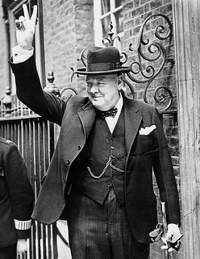
We, the aggrieved and belligerent Powers who are waging war against Germany, have no need to ask for respite. Every week our commerce grows; every month our organization is improved and reinforced. We feel ourselves more confident day by day of our ability to police the seas and oceans and to keep open and active the salt-water highways by which we have; and along which we shall draw the means of victory. It seems pretty certain that half the U-boats with which Germany began the war have been sunk, and that their new building has fallen far behind what we expected. Our faithful Asdic detector smells them out in the depths of the sea and, with the potent aid of the Royal Air Force, I do not doubt that we shall break their strength and break their purpose.
Euthanasia: The killing of mental patients by means of carbon monoxide gas is tried out in the jail at Brandenburg. By September 1941, more than 70,000 German mental patients will have been 'euthanized' in hospitals at Grafeneck, Brandenburg, Bernburg, Hartheim, Sonnenstein, and Hadamar, using carbon monoxide provided by the I.G. Farben corporation. (THP)
Genocide: Romanies: Dr. Ritter writes in a progress report to the DFG:
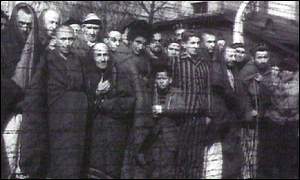
Through our work we have been able to establish that more than ninety per cent of so-called native Gypsies are of mixed blood . . . . The Gypsy question can only be considered solved when the main body of asocial and good-for-nothing Gypsy individuals of mixed blood is collected together in large labor camps and kept working there, and when the further breeding of this population of mixed blood is stopped once and for all.
1941 Various:
Holocaust: Steps Leading to the Establishment of the Warsaw Ghetto:
It was clear that this idea must at first appear to be incapable of execution, owing to the specific and extremely complicated conditions in the city of Warsaw. Objections were raised on various sides, in particular by the City Administration. It was argued that the forming of a ghetto would cause serious disruption to industry and the economy. As about 80 percent of all the skilled labor was Jewish, it was indispensable and could not be shut away. Finally it was argued that the feeding of the Jews would not be possible if they were concentrated in a closed area.
1941 USA: Inauguration: Franklin Delano Roosevelt, 32nd president, is inaugurated to his record third term in office as president of the United States.
In Washington's day the task of the people was to create and weld together a nation. In Lincoln's day the task of the people was to preserve that Nation from disruption from within. In this day the task of the people is to save that Nation and its institutions from disruption from without. To us there has come a time, in the midst of swift happenings, to pause for a moment and take stock—to recall what our place in history has been, and to rediscover what we are and what we may be. If we do not, we risk the real peril of inaction. Lives of nations are determined not by the count of years, but by the lifetime of the human spirit. The life of a man is threescore years and ten: a little more, a little less. The life of a nation is the fullness of the measure of its will to live. There are men who doubt this. There are men who believe that democracy, as a form of Government and a frame of life, is limited or measured by a kind of mystical and artificial fate that, for some unexplained reason, tyranny and slavery have become the surging wave of the future—and that freedom is an ebbing tide. But we Americans know that this is not true.
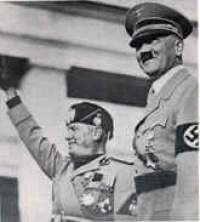
World War II: Hitler meets with Mussolini and offers aid in Albania and Greece. [See: How Did the Pact of Steel Effect Germany and Italy?]
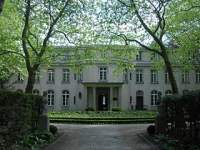
1942 Holocaust: The Wannsee Conference on the "Final Solution" of the Jewish question is held at Interpol headquarters in Wannsee, a quiet Berlin suburb. Reinhard Heydrich presents a plan for the "Final Solution" to the "Jewish Problem." Adolf Eichmann will be in charge of the department of the SS responsible for the execution of the plan [providing for the transportation of all of Europe's Jews to extermination camps. (THP) [See: What Was the Nature of Hitler's Anti-Semitism?]
1944 World War II: War in the Air: The RAF drops 2,300 ton of bombs on Berlin.
1945 Various:
USA: Inauguration: FDR, 32nd president, is inaugurated to his record fourth term in office as president of the United States. Harry S Truman is sworn in as Vice President. [Note: The 22d Amendment to the US Constitution, ratified in 1951, will restrict the presidency to two terms.]
We Americans of today, together with our allies, are passing through a period of supreme test. It is a test of our courage-of our resolve-of our wisdom-our essential democracy. If we meet that test-successfully and honorably-we shall perform a service of historic importance which men and women and children will honor throughout all time. As I stand here today, having taken the solemn oath of office in the presence of my fellow countrymen-in the presence of our God-I know that it is America's purpose that we shall not fail. In the days and in the years that are to come we shall work for a just and honorable peace, a durable peace, as today we work and fight for total victory in war. We can and we will achieve such a peace. [For the full text of FDR's speech, Click here.]
From Code-Name Down-Fall by Thomas R. Allen and Norman Polmar:Harry Truman had repeatedly said that he did not want to run for Vice President. But when the Democratic National Convention opened on July 19 (1944), he was a favorite. Roosevelt, hearing that Truman was balking, called the party's national chairman, Robert Hannegan, who held the telephone receiver so that others in the hotel room, including Truman, could hear the President's voice. 'Bob,' Roosevelt asked, 'have you got that fellow lined up yet?' Hannegan said he hadn't. Well,' Roosevelt replied, 'tell him that if he wants to break up the Democratic Party in the middle of the war, that's his responsibility.' Truman accepted, but he did not think it much of an honor. It was, he said, a job for a man who 'simply presides over the Senate and sits around hoping for a funeral.'
World War II: The Soviet offensive in East Prussia breaks through and Tilsit is taken. In the West, Patton's Third Army takes Brandenburg. [See: The Last Days of the Third Reich.]
Evacuation: Germany begins the evacuation of 1.8 million people from East Prussia, an operation which will take nearly two months to complete. [For further information, click here]
Holocaust: Birkenau: Four thousand, two hundred Jews are shot to death. A total of more than 98,000 Jews have been evacuated from Auschwitz. (THP)
Holocaust: Jan 20-27: Twenty-nine thousand Jews, most of them women, are evacuated from Stutthof by boat and train to Germany. 26,000 of them perish during the journey. (THP)
World War II: Hungary: The Allied Control Commission and Armistice in Hungary is instituted:
Hungary has withdrawn from the war against the Union of Soviet Socialist Republics and other United Nations, including Czechoslovakia, has severed all relations with Germany and has declared war on Germany. [For further details, Click here.]
World War II: Curtis E. LeMay takes command of the Twentieth Air Force in Marianas. The Fleet contains 345 aircraft, but in three months of bombing none of the nine top priority targets have been destroyed.
1946 Nuremberg Tribunal: Auschwitz: Day 44: Mme. Vaillant-Couturier:
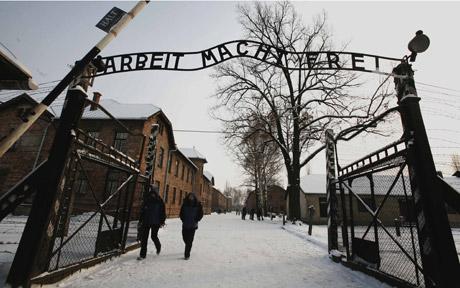
In the morning at 3:30 the whole camp was awakened and sent out on the plain, whereas normally the roll call was at 3:30 but inside the camp. We remained out in front of the camp until 5 in the afternoon, in the snow, without any food. Then when the signal was given we had to go through the door one by one, and we were struck in the back with a cudgel, each one of us, in order to make us run. Those who could not run, either because they were too old or too ill were caught by a hook and taken to Block 25, "waiting block" for the gas chamber. On that day 10 of the French women of our convoy were thus caught and taken to Block 25.
When all the internees were back in the camp, a party to which I belonged was organized to go and pick up the bodies of the dead which were scattered over the plain as on a battlefield. We carried to the yard of Block 25 the dead and the dying without distinction, and they remained there stacked up in a pile.
This Block 25, which was the anteroom of the gas chamber, if one may express it so, is well known to me because at that time we had been transferred to Block 26 and our windows 'Opened on the yard of Number 25. One saw stacks of corpses piled up in the courtyard, and from time to time a hand or a head would stir among the bodies, trying to free itself. It was a dying woman attempting to get free and live. The rate of mortality in that block was even more terrible than elsewhere because, having been condemned to death, they received food or drink only if there was something left in the cans in the kitchen; which means that very often they went for several days without a drop of water.
One of our companions, Annette Epaux, a fine young woman of 30, passing the block one day, was overcome with pity for those women who moaned from morning till night in all languages, "Drink. Drink. Water!" She came back to our block to get a little herbal tea, but as she was passing it through the bars of the window she was seen by the Aufseherin, who took her by the neck and threw her into Block 25. All my life I will remember Annette Epaux. Two days later I saw her on the truck which was taking the internees to the gas chamber. She had her arms -around another French woman, old Line Porcher, and when the truck started moving she cried, "Think of my little boy, if you ever get back to France." Then they started singing "The Marseillaise."
In Block 25, in the courtyard, there were rats as big as cats running about and gnawing the corpses and even attacking the dying who had not enough strength left to chase them away.
Another cause of mortality and epidemics was the fact that we were given food in large red mess tins, which were merely rinsed in cold water after each meal. As all the women were ill and had not the strength during the night to go to the trench which was used as a lavatory, the access to which was beyond description, they used these containers for a purpose for which they were not meant. [For further details, Click here.]
1949 Cold War: Truman announces Point Four program:

In his inaugural address, President Harry S. Truman calls for a "bold new program for making the benefits of our scientific advances and industrial progress available for the improvement and growth of underdeveloped nations." The resulting Point Four program (so-called because it was the fourth point in Truman's speech) resulted in millions of dollars in scientific and technical assistance—as well as hundreds of U.S. experts—sent to Latin American, Asian, Middle Eastern, and African nations.
Though Truman did not mention communism or the Soviet Union during his discussion of Point Four, it was clear that the program was part of a foreign policy designed to contain the Soviet threat . . . .
Abroad, suspicions arose that Point Four was merely another form of economic imperialism designed to force Third World nations to increase their natural resource production for the benefit of Western industries. Despite these concerns, America's technical assistance initiatives to other countries continued throughout the duration of the Cold War, though they came to operate under a variety of different program and agency names. [See: Harry S. Truman's Inaugural Address.]
1961 John F. Kennedy inaugurated:
On January 20, 1961, on the newly renovated east front of the United States Capitol, John Fitzgerald Kennedy is inaugurated as the 35th president of the United States. It was a cold and clear day, and the nation's capital was covered with a snowfall from the previous night. The ceremony began with a religious invocation and prayers, and then African-American opera singer Marian Anderson sang "The Star-Spangled Banner," and Robert Frost recited his poem "The Gift Outright." Kennedy was administered the oath of office by Chief Justice Earl Warren. During his famous inauguration address, Kennedy, the youngest candidate ever elected to the presidency and the country's first Catholic president, declared that "the torch has been passed to a new generation of Americans" and appealed to Americans to "ask not what your country can do for you, ask what you can do for your country." [For further information, click here]
1969 Richard Nixon takes office: Richard Nixon is inaugurated as president of the United States and says, "After a period of confrontation [in Vietnam], we are entering an era of negotiation." Eight years after losing to John F. Kennedy in the 1960 election, Nixon had defeated Hubert H. Humphrey for the presidency. [For further information, click here]
1980 Cold War: President Carter calls for Olympics to be moved from Moscow:
On January 20, 1980, in a letter to the United States Olympic Committee (USOC) and a television interview, U.S. President Jimmy Carter proposes that the 1980 Summer Olympics be moved from the planned host city, Moscow, if the Soviet Union failed to withdraw its troops from Afghanistan within a month. [For further information, click here]
1981 Ronald Reagan becomes president:

Ronald Reagan, former Western movie actor and host of television's popular "Death Valley Days" is sworn in as the 40th president of the United States.
During his eight years as president of the United States (1981-89), Reagan redefined the center in American politics, moving it away from the liberal Democrats and towards the conservative Republicans. Though his days as a western movie star were long past by then, Reagan continued to celebrate the mythic independence of the western pioneer as a parallel to modern conservatism. To drive home the point, Reagan made frequent and highly visible retreats to his California ranch, where he rode horses, fixed fences, and cut firewood for the TV cameras. This president, Reagan's actions seemed to say, was a self-reliant cowboy at heart and only a reluctant politician. [For further information, click here]
Edited by Levi Bookin (Copy editor)
levi.bookin@gmail.com



Click to join 3rdReichStudies

FAIR USE NOTICE: This site may contain copyrighted material the use of which has not always been specifically authorized by the copyright owner. We are making such material available in our efforts to advance understanding of historical, political, human rights, economic, democracy, scientific, environmental, and social justice issues, etc. We believe this constitutes a 'fair use' of any such copyrighted material as provided for in section 107 of the US Copyright Law. In accordance with Title 17 U.S.C. Section 107, the material on this site is distributed without profit to those who have expressed a prior interest in receiving the included information for research and educational purposes. If you wish to use copyrighted material from this site for purposes of your own that go beyond 'fair use', you must obtain permission from the copyright owner.
Please note that the list-owner and the moderators are not responsible for, and do not necessarily approve of, the random ads placed on our pages by our web server. They are, unfortunately, the price one pays for a 'free' website.